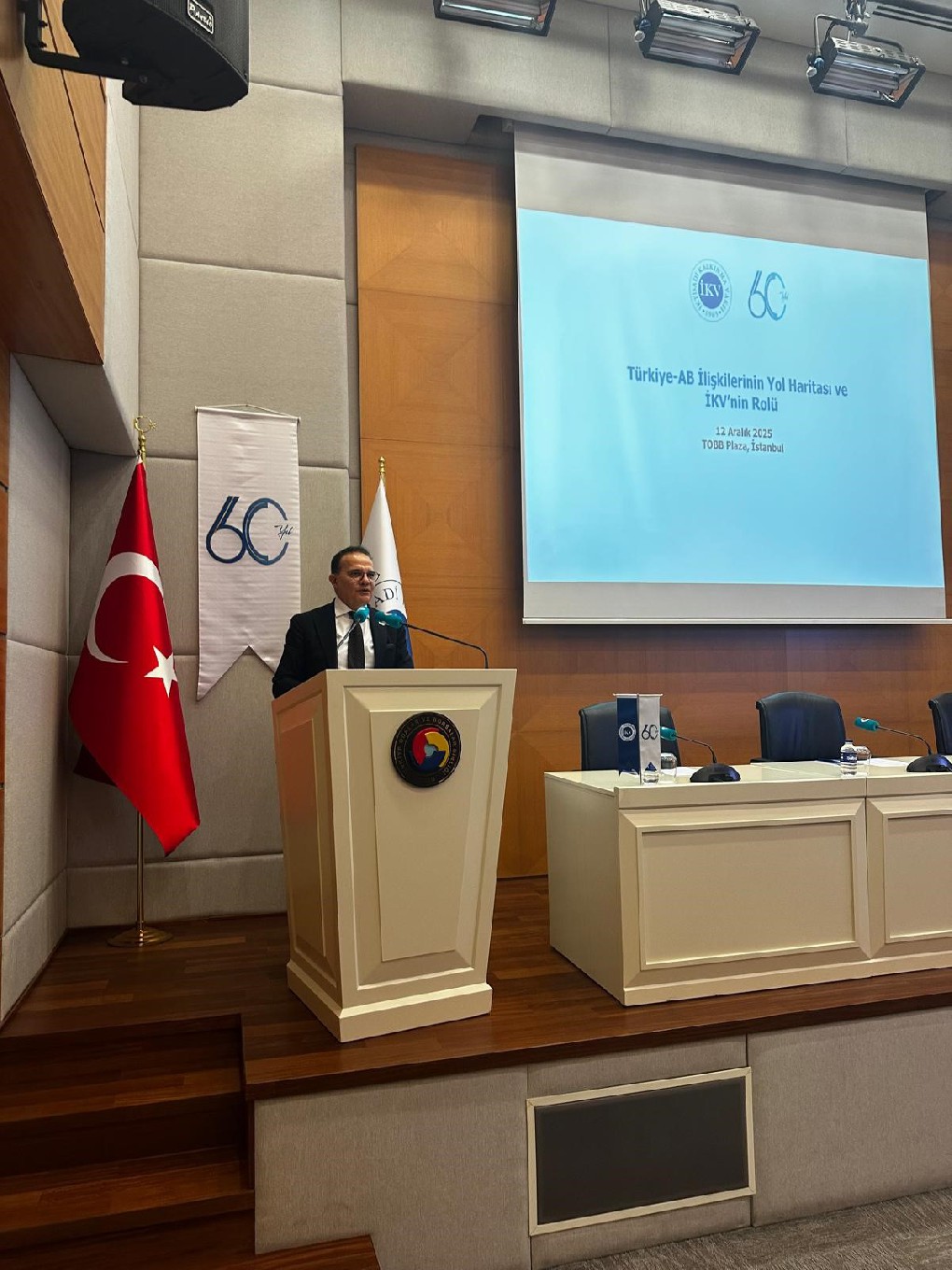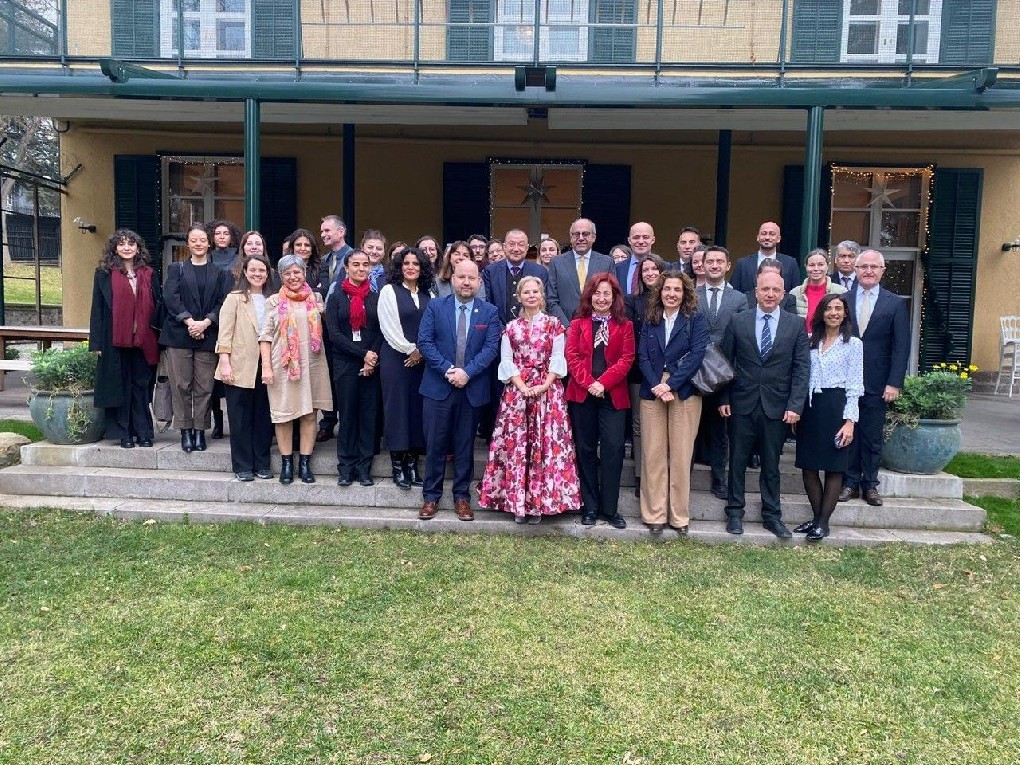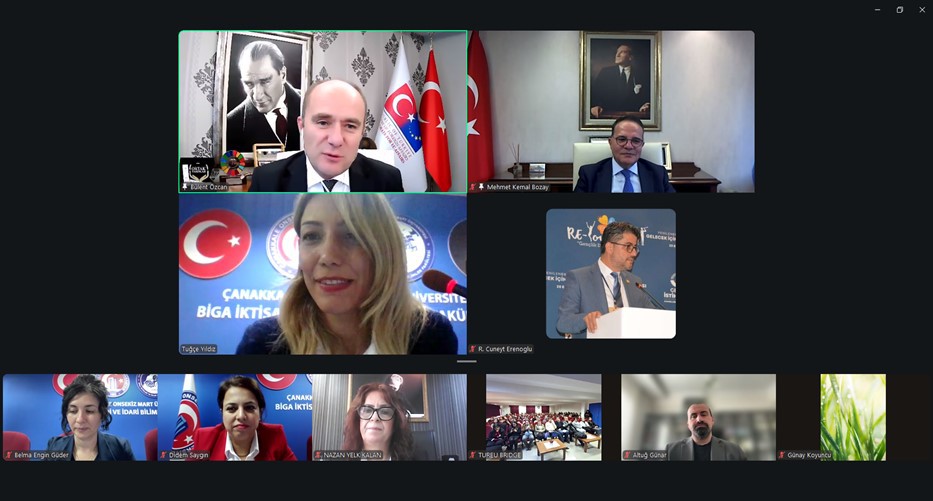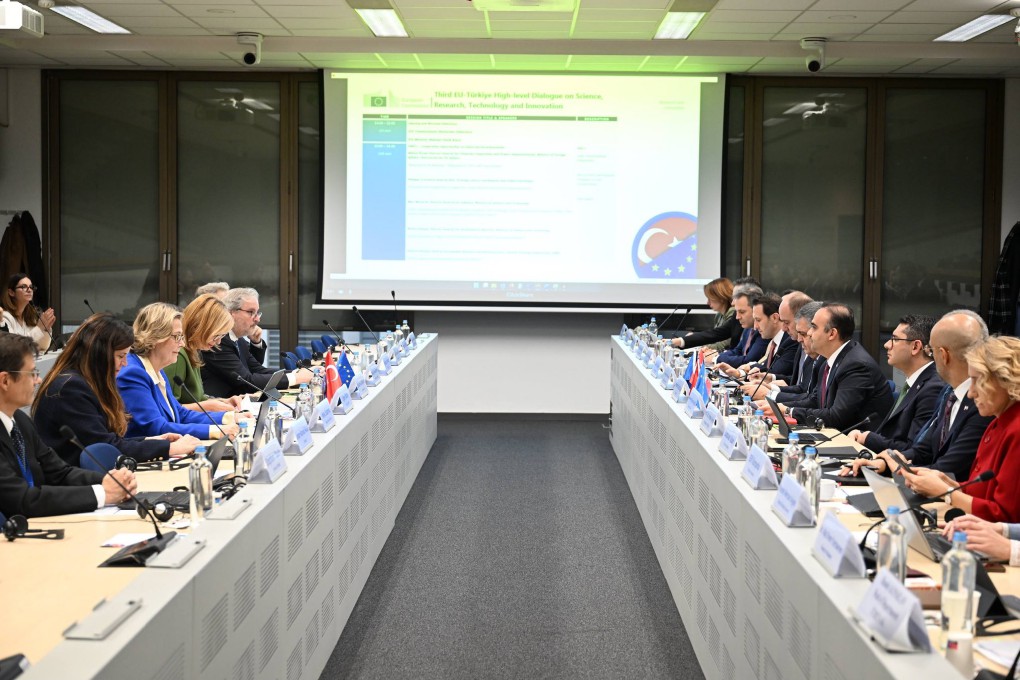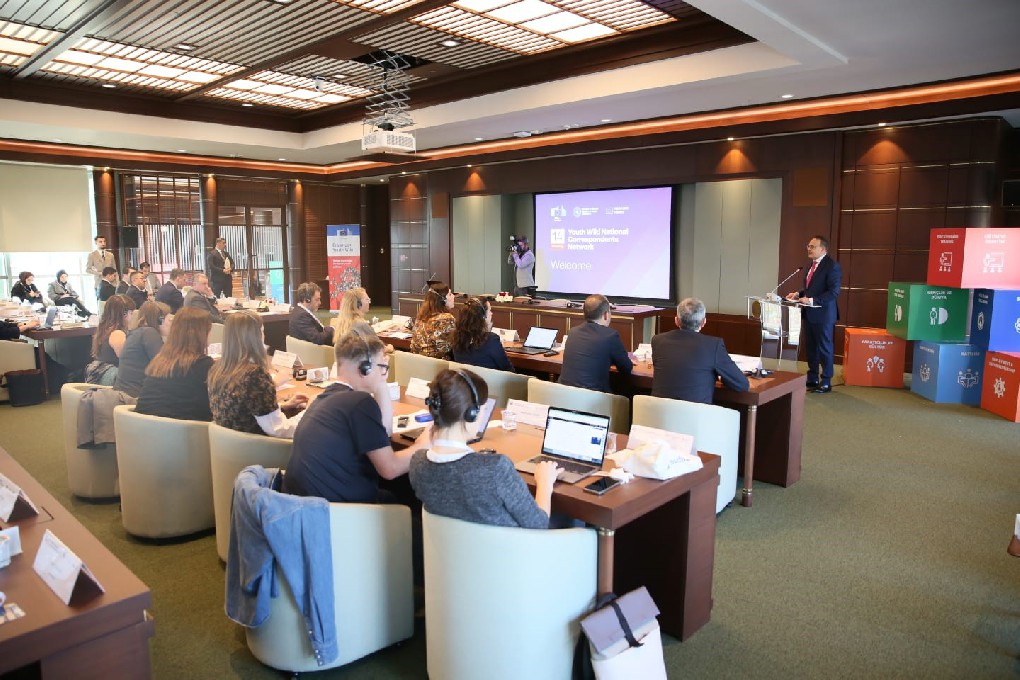- HOMEWelcome
- DIRECTORATE FOR EU AFFAIRSStructure
- E.U.Structure
- TÜRKİYE-EU RELATIONS
- History of Türkiye- EU Relations
- Main Documents
- Agreements
- Protocols
- Accession Partnership Documents
- National Programmes for the Adoption of the Acquis (NPAA)
- Türkiye Reports Prepared by the European Commission
- Enlargement Strategy Papers
- Türkiye’s National Action Plan for the EU Accession
- Türkiye’s National Action Plan for the EU Accession (2021-2023)
- Association Council Decisions
- Documents on Türkiye-EU Summits
- Institutional Structure
- Customs Union
- Türkiye- EU High Level Dialogue Meetings
- DATASources
- MEDIANews
- CONTACTContact Us
The 25th meeting of the Reform Monitoring Group
The 25th meeting of the Reform Monitoring Group was held in İstanbul on March 16, 2012 under the auspices of Minister for EU Affairs and Chief Negotiator Egemen Bağış with the participation of Minister of Justice Mr Sadullah Ergin, Minister for Foreign Affair Ahmet Davutoğlu and Minister of Interior İdris Naim Şahin, Undersecretary of the Prime Ministry Efkan Ala.
Reform Monitoring Group, which was established in 2003, is closely following the legislative work in the field of political criteria. The 24th meeting of the Reform Monitoring Group was held in Konya on December 18, 2011.

25th REFORM MONITORING GROUP MEETING
Press Statement
ISTANBUL, 16 March 2012
- The 25th meeting of the Reform Monitoring Group (RMG), which was established in 2003, was hosted in Istanbul by Egemen Bağış, Minister for European Union Affairs and Chief Negotiator, with the participation of Sadullah Ergin, Minister of Justice, Prof. Dr. Ahmet Davutoğlu, Minister of Foreign Affairs, and İdris Naim Şahin, Minister of Interior.
- As an indication of support of the Turkish Grand National Assembly (TGNA) in the European Union (EU) accession process, Volkan Bozkır, the Chairman of the Foreign Affairs Committee, Mehmet Sayım Tekelioğlu, the Chairman of the EU Harmonisation Committee, and Afif Demirkıran, the co-Chairman of the Türkiye-EU Joint Parliamentary Committee have also participated.
- High level officials from Prime Ministry, Ministry for EU Affairs, Ministry of Justice, Ministry of Foreign Affairs and Ministry of Interior have also participated in the meeting.
- Our determination regarding the political reforms, which comprise the most significant pillar of Türkiye’s EU accession process, has been confirmed despite the serious economic crisis that the EU has been experiencing and various negative developments in Turkish-EU relations.
- It has been emphasized that, irrespective of the EU accession process, every reform undertaken, especially in the political area, has contributed to ensure that our citizens live in a country which is more democratic, prosperous and respectful of human rights.
- In light of the decisions taken at the last RMG meeting held on 18 December 2011, the steps taken earlier this year and further steps envisaged for the remaining of 2012 have been comprehensively addressed.
- It has been reiterated that the “Positive Agenda”, set forth by the European Commission to compensate the unfair treatment Türkiye is facing in its negotiation process, will not constitute an alternative to the accession negotiations but will support and complement this process.
- Within the framework of the “Positive Agenda”, the formation of “working groups” for eight chapters, including Chapter 23 on “Judiciary and Fundamental Rights” and Chapter 24 on “Justice, Freedom and Security”, which are blocked due to political reasons, has been approved.
EU had stated in the 2011 Enlargement Strategy that Chapters 23 and 24 would be the first chapters to be opened to negotiations and the final ones to be closed and that no other chapters could be opened before the opening of these chapters. However, the opening of these two chapters in which Türkiye is recording constant progress is blocked by the Southern Greek Cypriot Administration. The EU should resolve this contradiction and open these two chapters to negotiations without further delay.
- The preparation of a new civil Constitution is a priority for our country as well as a major expectation of the people. Work on the new Constitution, to meet the needs of our country which is currently going through a transformation process and to address the expectations of our people for an enhanced democracy, is continuing with extensive participation and with respect to the principle of transparency.
- With the aim of preparing a liberal civil Constitution respecting the rule of law and human rights and broadening democratic rights in terms of the relation between the individual and the state, all segments of the society, including our citizens of different faiths, are submitting their proposals and contributions to the TGNA Conciliation Committee.
- As stated by Cemil Çiçek, the Speaker of the TGNA, on several occasions, work to prepare a draft for the new Constitution is foreseen to be initiated in May 2012. We hope that all our citizens, universities and civil society institutions will actively contribute to this process and we call upon the relevant parties to act accordingly.
- Issues such as the improvement of judicial services, trial and detention periods, institutionalization in the field of human rights, fundamental rights and freedoms, freedom of expression and the media, protection of personal data and the dialogue with Turkish citizens of different faiths were addressed and necessary steps on these issues were discussed.
- It was determined that the positive results of the arrangements taken in the framework of the Judicial Reform Strategy to address the lengthy trial periods, which is the main reason for long detention periods, have already been observed. Furthermore, it was underlined that two reform packages for the improvement of judicial services have been enacted and the 3rd reform package under discussion at the relevant TGNA Justice Sub-Committee will further contribute to this process.
- 3rd Judicial Reform Package covers significant arrangements concerning improvement in the freedom of expression and media. These arrangements are of critical importance in terms of meeting the criticisms and recommendations in the EU Progress Reports. In this respect, amendments will be made to Articles 220, 277, 285 and 288 of the Turkish Penal Code and Articles 2, 6 and 13 of the Anti-Terror Law. Investigations and proceedings against some members of the media are based on such articles. Through these amendments, suspension of the publication of several periodicals will be lifted.
- Further enhancement of the protection of the right to privacy with the amendments to Articles 132, 133, and 134 of the Turkish Penal Code proposed by the 3rd Judicial Reform Package has been welcomed.
- The importance of the “Action Plan on the Freedom of Expression” which is being prepared by the Ministry of Justice has also been welcomed.
- Ministry of Justice has finalized the “Action Plan on Preventing Human Rights Violations” that contains concrete objectives towards finding solutions through a timetable in areas in which the European Court of Human Rights (ECtHR) has ruled against our country. It is foreseen that the Action Plan will enter into force by the end of April 2012, after obtaining the views of relevant institutions.
- Preparation of the 4th Judicial Reform Package is in its final stage. Significant improvements towards raising the standards of human rights, including freedom of expression and the media, are provided for in this Package. The package also aims to conclude the pending cases before the ECtHR against Türkiye in a shorter period, by applying a pilot case method, through a committee to be established in compliance with domestic law. As a result, around 3000 cases pending before the ECtHR will be resolved.
- Draft law on the protection of personal data, prepared in accordance with the EU acquis by the Ministry of Justice, will be submitted to the TGNA soon.
- With the enactment of the draft “Law on Mediation in Legal Disputes” which is under discussion in the Justice Committee of the TGNA, legal disputes will be settled before legal action is taken. This law will ensure that the workload of judiciary is decreased and the trial process is shortened.
- Draft law prepared with the aim of combating the financing of terrorism, which will be effective in the national and international fight against terrorism, is on the agenda of TGNA Justice Committee and is envisaged to be enacted soon.
- The activities of the working group formed by the Ministry of Justice to carry out the necessary work on legislation regarding the principles of juvenile justice and resolve the problems arising from implementation, have been assessed.
- In order to introduce a holistic approach to human rights in our administrative structure and to ensure institutionalization in the area of human rights, it has been decided to submit the relevant draft laws to the TGNA prepared in accordance with the EU acquis and international standards.
- A new proposal was submitted to the TGNA to reinitiate the procedure concerning the draft “Law on Turkish National Human Rights Institution”. It was underlined that the main objective is to ensure the compliance of the National Human Rights Institution with the Paris Principles and to have this institution accredited with the “A” status.
- As part of Türkiye’s obligations arising from the ratification of OPCAT (Optional Protocol to the UN Convention against Torture and other Cruel, Inhuman or Degrading Treatment or Punishment), it was considered that the Turkish National Human Rights Institution may become the national control mechanism which is foreseen to be established through this Protocol.
- A new proposal was submitted to the TGNA to reinitiate the procedure concerning the draft “Law regarding the Establishment of the Supervisory Commission on Law Enforcement Officers”, which had been prepared and submitted to the TGNA by the Ministry of Interior previously during the 60th Government.
- It was decided to complete and submit the draft “Law on Ombudsman Institution" to the TGNA.
- The issues regarding the draft “Law on Anti-Discrimination and Equality Board” have been reviewed. The draft was prepared in order to ensure the effective implementation of the equality principle and anti-discrimination rule stated in Article 10 of the Constitution, to prevent the grievances caused by discrimination, to fulfill the obligations arising from international agreements to which Türkiye is a party and to ensure harmonization with the EU acquis,
- It has also been underlined that our citizens will be entitled to individual application to the Constitutional Court of Türkiye as of 23 September 2012 pursuant to the amendment made to the Law on the Establishment and Rules of Procedure of the Constitutional Court.
- The legislative amendments and changes in implementation that need to be undertaken by our Government in order to implement the decisions of the ECtHR have also been addressed.
- The Law on Protection of Family and Prevention of Violence Against Women, which was prepared to protect women, children and family members who are exposed to or are at the risk of being exposed to violence or are victims of stalking and to prevent violence against these persons, has been enacted on 8 March 2012, on the International Women’s Day.
- Council of Europe Convention on Preventing and Combating Violence Against Women and Domestic Violence, which was signed by the Minister of Foreign Affairs in Istanbul on 11 May 2011, has been ratified. Türkiye deposited the instrument of ratification to the Secretary General of the Council of Europe on 14 March 2012. Türkiye has become the first member state of the Council of Europe to sign and ratify the Convention.
- Our Government is continuing to strengthen religious freedoms in Türkiye. The process of dialogue with our citizens of different faiths is ongoing. 300 citizens representing different faith groups have attended the 5th Civil Society Dialogue Meeting (of the Ministry of EU Affairs) which was held on 14 February 2012 under the auspices of Egemen Bağış, Minister for European Affairs and Chief Negotiator. In the meeting, outstanding issues of our citizens of different faith groups and their proposals were addressed.
- Prof. Dr. Ahmet Davutoğlu, Minister of Foreign Affairs, also held a meeting with the community leaders and prominent community members of different faith groups in Istanbul on 3 March 2012. In the meeting, the recent issues were addressed.
- According to the General Assembly Decision of the Directorate General of Press Advertisement published on 28 February 2012, newspapers belonging to minorities referred to in the Lausanne Treaty may publish official advertisements upon a written application.
- Within the framework of a provisional article to the Law on Foundations regarding immovable properties owned by groups/foundations of different faiths, which entered into force on 27 August 2011, the application made by Galata Greek Primary School Foundation has been finalized in February 2012 and premises of Galata Greek Primary School located in Karaköy has been returned to this foundation.
- Work is ongoing on the Chapter 24 on “Justice, Freedom and Security” which includes important issues such as the visa regime for Turkish citizens, as well as migration and integrated border management.
- Any efforts made by the European Commission to facilitate the visa regime for Turkish citizens and alleviate the problems our citizens face when applying for the Schengen visa are being closely followed. However, while limited positive steps have been taken, there have not been significant developments regarding the full application of the EU Regulation on visa regime to Türkiye that is applied to candidate and potential candidate countries as well as some third countries.
- The visa regime applied by the EU to our citizens is unfair and illegal. This regime is also discriminatory due to its negative effects on the competitiveness of Turkish citizens in the context of our commercial relations with the EU, which have been intensified by the Customs Union. Türkiye expects the Justice and Home Affairs Council of the EU to immediately give a mandate to the European Commission to initiate the negotiations for visa liberalization.
- Our position regarding the Readmission Agreement is clear. In order to initial this agreement, Türkiye is expecting a mandate to be given to the European Commission to initiate negotiations on visa exemption for Turkish citizens in the Schengen Area and to convey the roadmap regarding the process.
- Our Government continues to deal with irregular immigration effectively through amendments in legislation and measures taken. As Türkiye is a neighbour to both an unstable region and the EU Member States, it has been underlined that effective action against irregular immigration can only be possible through cooperation and fair burden-sharing by the EU, Türkiye and other countries on the same route of migration.
- On 15 March 2012, talks were carried out in Ankara with officials from the European Commission regarding the fight against irregular immigration. Our cooperation on this issue is being carried out in a framework of mutual understanding.
- Draft “Law on Foreigners and International Protection”, which aims to strengthen the institutional capacity of our country regarding immigration and international protection, has been prepared by the Ministry of Interior with the participation of relevant public institutions, international institutions, civil society organizations and other relevant parties and has been submitted to the Prime Ministry. The principles and procedures concerning the entry to, residence in and exit from Türkiye, the scope and the implementation of the protection to be provided for foreigners who request protection, as well as the establishment, duties and authorities of the Directorate General of Migration Management at the Ministry of Interior have been laid down in this draft law.
- Work is also ongoing on the draft “Law on the Fight Against Human Trafficking and Protection of Victims”. Due to the benefit of the enactment of these two draft laws together, it has been agreed to carry out and complete the relevant work simultaneously.
- Work is continuing on the draft “Law on the Organization of the Directorate General for Border Security” which will constitute a basis for the arrangements on restructuring border management.
- 26th meeting of the RMG will be hosted by Idris Naim Şahin, Minister of Interior, in Ordu in June 2012.

